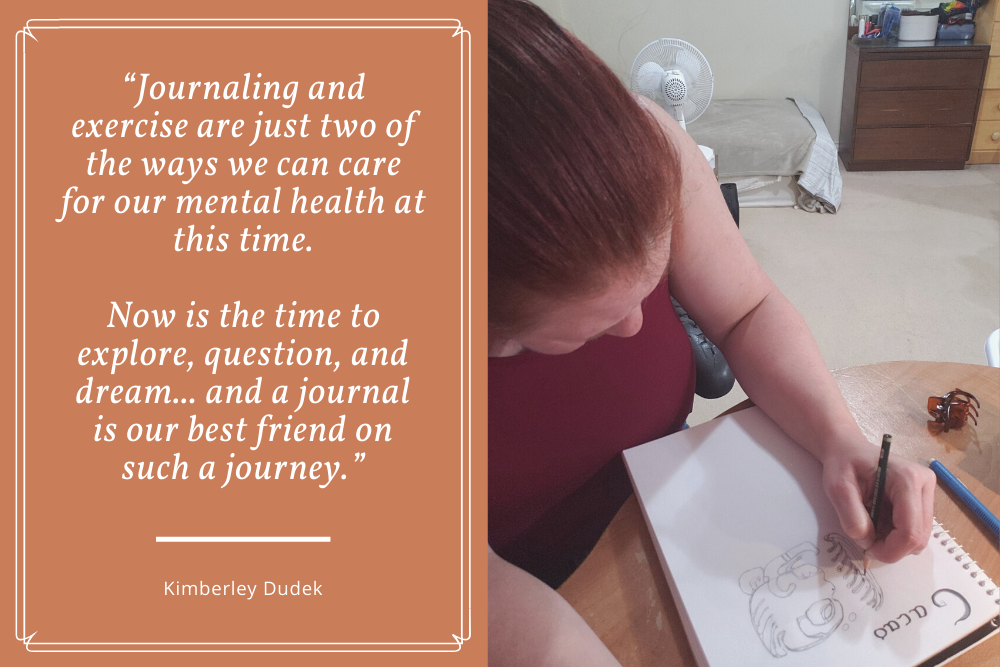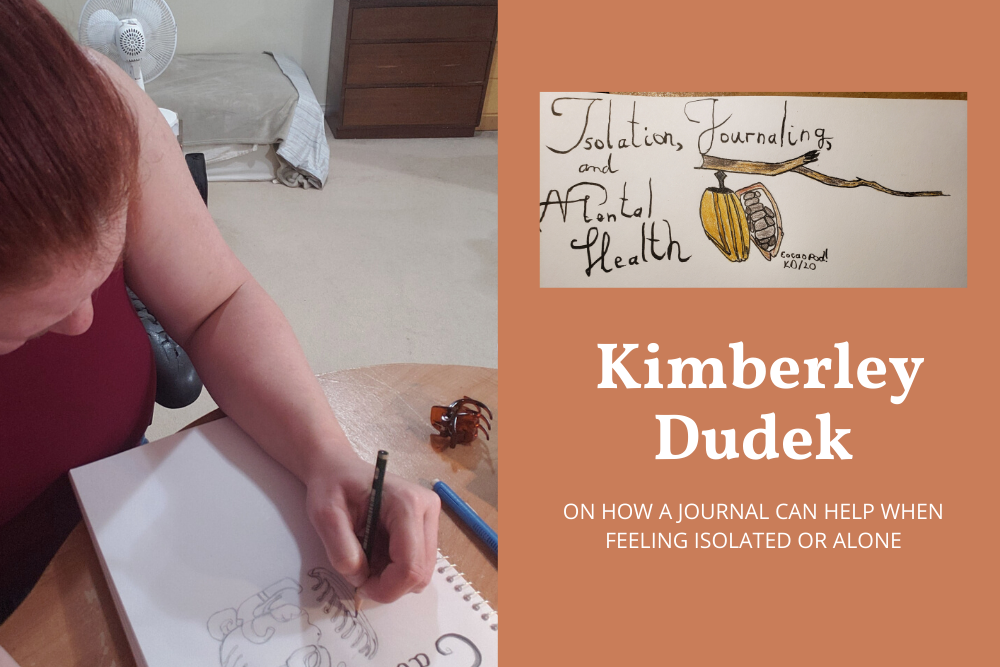Sometimes at the Endpaper Blog we get the unique opportunity to offer a platform to creative journallers from around the world. Today, we welcome Kimberley Dudek back to share her personal perspective on the isolating aspects of this COVID-19 pandemic, and how journalling has been a helpful tool for making it through. Unfortunately, Kim and other people with unseen disabilities like Autism and Asperger’s have been hit especially hard during the shutdown, as outside of the gym, necessary errands and occasionally seeing her parents, Kimberley has been in near complete social isolation as a result of sensory issues.
Kimberley is the founder of Aspies Inc., a not-for-profit advocacy business focused on raising awareness of Asperger’s syndrome and giving those with Asperger’s a platform to tell their stories. You may also remember Kim from her role in our short documentary Mindfulness, Journalling and Mental Health or her blog post Journalling for Emotional Support from this past World Autism Awareness Day.
You can learn about Kim and her work on her website: aspies.ca.

Isolation, Journalling and Mental Health
by Kimberley Dudek
The COVID-19 pandemic will have definite mental health repercussions. The repercussions for those with sensory disabilities will be more serious. The sudden eruption of the coronavirus largely contributed to the overwhelming stress those with autism and Asperger’s Syndrome suddenly faced. The myriad of extra precautions and the closure of all but essential services meant that there was no longer any sense of normalcy.
Since 2019, the COVID crisis has left many with Asperger’s Syndrome and autism with little to no mental health supports. The sudden onset of the virus has caused those with Asperger’s to have to adjust to new rules, regulations, and changes, which is very difficult. The loss of supports and onset of new social guidelines causes additional stress as the rapid adjustment is not something that those with Asperger’s are used to. It disrupts the set routine that we depend and thrive on.
Journaling can be an enormous mental health support, especially during times such as these. I often find that people dislike “writing” in a journal. In truth, your journal can be so much more than that! It’s a place to safely let go of your thoughts, feelings, and emotions. But it’s also a place to record things like that new recipe you just tried or what chores you did and how clean your home looks. It’s a place to draw, sketch, or write music, songs, or poetry. It’s a place to keep track of all the words you’ve learned in the new language you’re studying. Think of your journal as a record. Those who will see it in the future will say, “Look at what this person accomplished during such a challenging time!”
Journaling helped me to stay positive, something that I struggle to do. It helped me release my fears for those of my friends who were and still are fighting on the front lines of this pandemic. I use my journal to track what I did each day, any tasks I needed to do, and a lot more. Everything from new recipes and the results to music playlists, to new artistry designs, thoughts about the COVID-19 situation and more.

During this time, I would suggest that people indulge in other pursuits that they may not otherwise have time to indulge in as a form of both stress relief and mental health support. Try to keep your routine as normal as possible. Get some exercise each day. I used my journal to track how much exercise I got each day and what I saw if I had gone out cycling or for a walk! I also took the time to indulge some of my other loves, such as sketching, studying Mayan glyphs, and colouring. In addition to journaling, I made it a point to take at least one photo each day for the thirty-day state of emergency period. It was amazing to see what I captured on camera.
Increased stress levels are just one of the problems those with mental health disorders face. Sensory and social issues such as masks, negative social media, and paranoia are just some of what people with Asperger’s and autism likely experienced. People with Asperger’s Syndrome expend all their energy trying to understand the social situation they are in. When something such as the COVID virus impacts their idea of normalcy, it can cause abnormal stress and distress. They cannot understand why the routine they are so used to each day has suddenly gone out the window.
For those with anxiety, a worry journal is a place to release your fears, thoughts, feelings, and more, not just how you feel yourself but your worries for your friends or for family who don’t live near you. People who are fighting on the front lines may also find journaling to be a support in relieving stress, emotions, fear, and other aspects of their job that may be challenging at a time like this. For those who are neurodiverse, writing in a journal can also lend structure to daily life, as it’s something that they can set time aside for each day. If writing isn’t your thing, don’t worry! A visual journal can be just as much fun as a written journal. A visual journal is like a daily scrapbook/sketchbook. It is a place to sketch, draw, glue, doodle, and more!
Journaling and exercise are just two of the ways we can care for our mental health at this time. Now is the time to explore, question, and dream…and a journal is our best friend on such a journey.
Have you found yourself journalling more during the pandemic? What other activities do you find useful when dealing with anxiety or isolation?
Mental health affects us all. If you or someone you know needs help, you are not alone.
Call 1-800-273-8255 for the National Suicide Prevention Lifeline in the United States or 1-833-456-4566 for Crisis Services Canada.
Outside of North America, please visit the International Association for Suicide Prevention for a database of resources: www.iasp.info.





